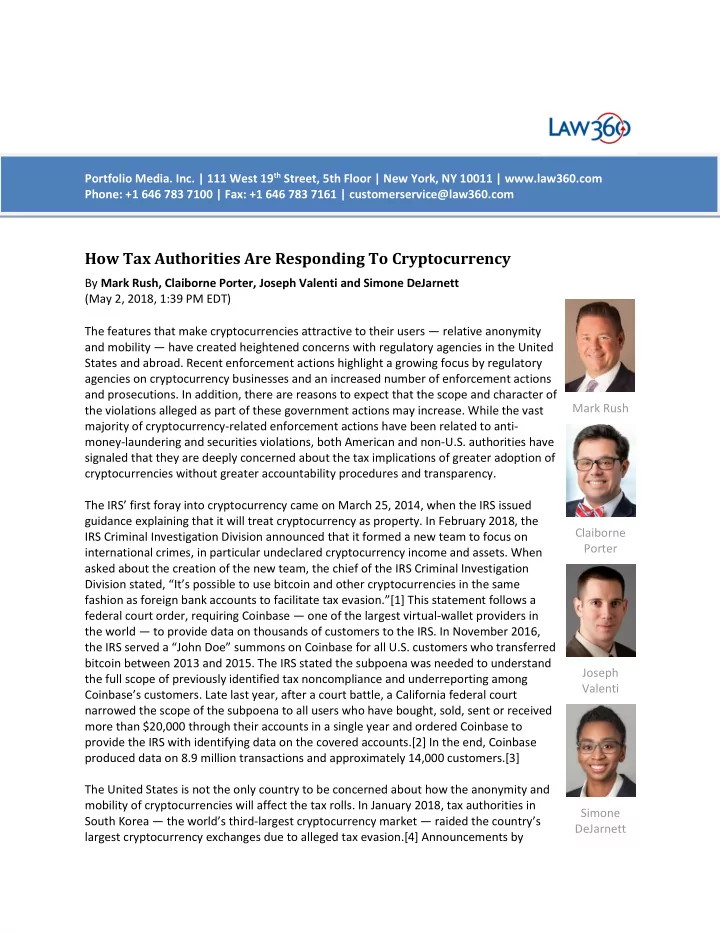

Portfolio Media. Inc. | 111 West 19 th Street, 5th Floor | New York, NY 10011 | www.law360.com Phone: +1 646 783 7100 | Fax: +1 646 783 7161 | customerservice@law360.com How Tax Authorities Are Responding To Cryptocurrency By Mark Rush, Claiborne Porter, Joseph Valenti and Simone DeJarnett (May 2, 2018, 1:39 PM EDT) The features that make cryptocurrencies attractive to their users — relative anonymity and mobility — have created heightened concerns with regulatory agencies in the United States and abroad. Recent enforcement actions highlight a growing focus by regulatory agencies on cryptocurrency businesses and an increased number of enforcement actions and prosecutions. In addition, there are reasons to expect that the scope and character of Mark Rush the violations alleged as part of these government actions may increase. While the vast majority of cryptocurrency-related enforcement actions have been related to anti- money-laundering and securities violations, both American and non-U.S. authorities have signaled that they are deeply concerned about the tax implications of greater adoption of cryptocurrencies without greater accountability procedures and transparency. The IRS ’ first foray into cryptocurrency came on March 25, 2014, when the IRS issued guidance explaining that it will treat cryptocurrency as property. In February 2018, the Claiborne IRS Criminal Investigation Division announced that it formed a new team to focus on Porter international crimes, in particular undeclared cryptocurrency income and assets. When asked about the creation of the new team, the chief of the IRS Criminal Investigation Division stated, “It’s possible to use bitcoin and other cryptocurrencies in the same fas hion as foreign bank accounts to facilitate tax evasion.”[1] This statement follows a federal court order, requiring Coinbase — one of the largest virtual-wallet providers in the world — to provide data on thousands of customers to the IRS. In November 2016, the IRS served a “John Doe” summons on Coinbase for all U.S. customers who transferred bitcoin between 2013 and 2015. The IRS stated the subpoena was needed to understand Joseph the full scope of previously identified tax noncompliance and underreporting among Valenti Coinbase’s customers. Late last year, after a court battle, a California federal court narrowed the scope of the subpoena to all users who have bought, sold, sent or received more than $20,000 through their accounts in a single year and ordered Coinbase to provide the IRS with identifying data on the covered accounts.[2] In the end, Coinbase produced data on 8.9 million transactions and approximately 14,000 customers.[3] The United States is not the only country to be concerned about how the anonymity and mobility of cryptocurrencies will affect the tax rolls. In January 2018, tax authorities in Simone South Korea — the world’s third -largest cryptocurrency market — raided the country’s DeJarnett largest cryptocurrency exchanges due to alleged tax evasion.[4] Announcements by
central banking authorities in Europe suggest that they too are concerned with the potential for tax evasion. For example, in February, the finance ministers and central bank leaders of France and Germany wrote a joint letter to the G-20 calling for greater regulation of cryptocurrencies.[5] The two countries expressed worry that cryptocurrencies “can be vulnerable to financial crime without proper appropriate measures” and called for “transboundary” action to regulate the currencies.[6] Given the recent enforcement actions by the U.S. Securities and Exchange Commission, the Financial Crimes Enforcement Network, the U.S. Commodity Futures Trading Commission, and the U.S. Department of Justice, actors who are offering — or plan to offer — accounts, trading and other services to holders of cryptocurrencies should take necessary precautions to ensure that they are complying with applicable U.S. federal income and foreign tax regulations. To better understand the precautions, we will first discuss the background of cryptocurrencies. The remainder of this article will: • Outline U.S. federal income tax regulations on cryptocurrencies; • Discuss a series of best practices based on the Swiss Bank Program, which addressed similar accountability and transparency concerns; and • Briefly discuss cryptocurrency trends abroad. Background on Cryptocurrency Bitcoin and other cryptocurrencies are decentralized digital currencies. Unlike government-issued fiat currency, cryptocurrency systems lack a central bank and all transactions take place between users — peer to peer. Transactions are recorded on a blockchain, a shared distributed ledger.[7] A blockchain is what ensures that each digital coin is spent only once, allowing cryptocurrency to exist without a central authority. Bitcoin — the first and most valuable cryptocurrency — became available in 2009. There are now over 20 cryptocurrencies with a market capitalization of over $1 billion.[8] Bitcoin is the largest, followed by ethereum and ripple.[9] Users conduct cryptocurrency transactions through a virtual wallet. The wallets store the cryptocurrency and facilitate transactions between parties. Wallets can be hardware-based or software-based, software wallets can be hosted on the cloud, personal computers or mobile devices.[10] There are also cryptocurrency exchanges (such as Coinbase) that permit a person to buy and sell cryptocurrency like a government-issued fiat currency. While bitcoin and its successors were little accepted when they first became available, they have rapidly grown in acceptability. Today, a wide range of businesses accept bitcoin and the other popular cryptocurrencies as payment, including a large software company, public universities and some accounting firms.[11] However, the acceptance of cryptocurrencies is not universal — for example, at least one large U.S.-based bank does not allow its customers to pay for cryptocurrency with funds in its accounts.[12] Also, the recent sharp spike and subsequent fall in the value of bitcoin and other cryptocurrencies prompted some vendors to pull out of the market. A U.K.-based multinational bank and a U.S.-based financial-services corporation blocked their credit card customers from using their cards at cryptocurrency exchanges.[13] Still, interest in cryptocurrencies remains high. Businesses wishing to provide services to users of cryptocurrencies should take proper precautions to ensure that they are not running afoul of relevant
Recommend
More recommend